Archdiocesan response to abuse crisis, death of Archbishop Buechlein, top local news stories
By Brandon A. Evans
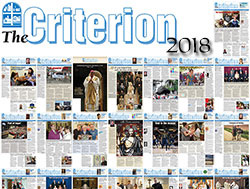 The archdiocesan response to the ongoing clergy sex abuse crisis was voted the top local news story of 2018, followed by coverage of the death of Archbishop Emeritus Daniel M. Buechlein.
The archdiocesan response to the ongoing clergy sex abuse crisis was voted the top local news story of 2018, followed by coverage of the death of Archbishop Emeritus Daniel M. Buechlein.
Other stories of note included the issuing of a pastoral letter on Christian anthropology by Archbishop Charles C. Thompson, local coverage of young Catholics in preparation for a youth synod in Rome and the controversy surrounding a guidance counselor at Roncalli High School in Indianapolis.
Following the tradition of other news agencies, The Criterion editorial staff votes each year on the top 10 local stories that were published in our newspaper.
Many of the top stories selected this year were covered in multiple articles. Links to all the original coverage are below.
Among the hundreds of locally produced news stories during 2018, here is our “Top 10” list:
1. The local Church responds to the ongoing clergy sex abuse crisis.
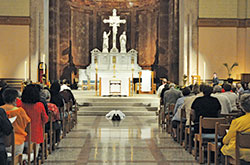
Worshippers kneel in prayer while Archbishop Charles C. Thompson lays prostrate on the floor of SS. Peter and Paul Cathedral in Indianapolis on Sept. 15 during a “Holy Hour for Prayer, Penance and Healing” for victims of sexual abuse. (Photos by Sean Gallagher)
By far the largest news story in the Catholic Church in America in 2018, the clergy sex abuse crisis garnered headlines with shocking accusations against a retired U.S. cardinal and only got worse.
Archbishop Thompson wrote in August to the Church in central and southern Indiana about the headlines: “Coming on the heels of the scandal surrounding then-Cardinal Theodore E. McCarrick that evidently involved at least three different large dioceses, and apparently known by more than a few people, the nearly 900 pages of the grand jury report on clergy sexual abuse in six dioceses of Pennsylvania has seemingly ripped the scab off a horrible wound that was just beginning to possibly heal.”
In response to new revelations about abusive clergy—and those in power who allowed them to operate—Archbishop Thompson called for a “Holy Hour for Prayer, Penance and Healing” at SS. Peter and Paul Cathedral in Indianapolis on Sept. 15, which opened with him lying prostrate before the altar.
It was an act of penance, he said, “and a pledge of doing everything in my power to do what is right, just and holy in eradicating the great scourge of sexual abuse and sexual harassment of all persons, most especially children and young people, making every effort to prevent it from happening again.”
In addition to acting swiftly on new accusations of abuse on the part of a retired priest and misconduct on the part of an active pastor, archdiocesan officials also released a comprehensive list “of clergy who have been credibly accused of sexual abuse of a minor or young person.”
The list dates back to the 1940s and includes both archdiocesan priests and members of religious orders, detailing the number of accusations and other biographical information.
The list also included information on how to report a claim of abuse; similar information appears every week in The Criterion.
News Coverage:
Other Stories:
Related:
2. Archbishop Emeritus Daniel M. Buechlein passes away.
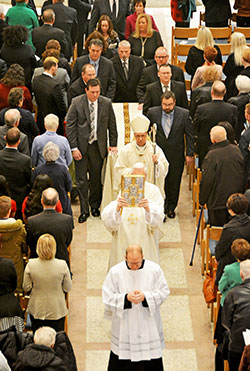
Indianapolis Archbishop Charles C. Thompson processes in front of the casket of Archbishop Emeritus Daniel M. Buechlein, former shepherd of the Church in central and southern Indiana, at the end of his Jan. 31 funeral Mass at SS. Peter and Paul Cathedral in Indianapolis. Archbishop Buechlein died on Jan. 25 at age 79. (Photo by Natalie Hoefer)
Archbishop Emeritus Daniel M. Buechlein served as the head of the Church in central and southern Indianapolis from 1992 until he was forced by health concerns—including a stroke—to retire in 2011.
Since then, he spent his time in prayer for the people of the archdiocese while living at Saint Meinrad Archabbey in St. Meinrad, the place where he began his ministry to God as a monk in 1963.
On Jan. 25, he passed away in the archabbey infirmary; after a funeral Mass inside a packed SS. Peter and Paul Cathedral, his body was returned to Saint Meinrad for a simple burial.
“Though he will be greatly missed, Archbishop Daniel’s legacy of always pointing to Jesus Christ will continue among us,” Archbishop Thompson said. “He was a faithful monk, priest, rector and bishop. Like so many, I will certainly miss him. He was such a tremendous model of prayerfulness, holiness and leadership. I also feel deeply blessed to have many wonderful memories of him.”
Among other accomplishments during his 19 years as archbishop, enrollment in Catholic schools increased by 30 percent; ministry to youth, young adults and Hispanic Catholics was strengthened; the permanent diaconate program was started; the Bishop Simon Bruté College Seminary in Indianapolis was founded; Catholic Charities expanded its services to include aiding 200,000 people per year; and 337 endowments worth $109 million were established through the Catholic Community Foundation.
News Coverage:
Other Stories:
Related:
3. Archbishop Thompson issues a pastoral letter on issues of human dignity.
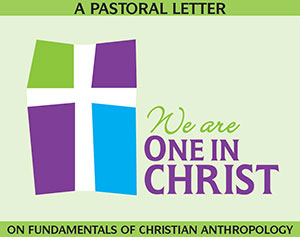 On Ash Wednesday (Feb. 14) of this year, Archbishop Thompson issued a pastoral letter titled “We are One in Christ: A Pastoral Letter to the Clergy, Religious and Faithful People of Central and Southern Indiana on Fundamentals of Christian Anthropology.”
On Ash Wednesday (Feb. 14) of this year, Archbishop Thompson issued a pastoral letter titled “We are One in Christ: A Pastoral Letter to the Clergy, Religious and Faithful People of Central and Southern Indiana on Fundamentals of Christian Anthropology.”
A story in The Criterion noted that the archbishop “explores a number of issues that are widely debated in society from the perspective of Christian anthropology, which [Archbishop Thompson] described as ‘the way Christians view human dignity and the end or purpose of human society.’
“The faithful’s response to issues such as immigration, abortion, racism, religious liberty and drug abuse,” Archbishop Thompson said, should be “deeply rooted in the Church’s understanding of the origin, nature and destiny of the human person as revealed in Jesus Christ.
“Where we come from, who we are and where we are headed as individuals and as diverse communities of people,” he noted, “determines our rights and responsibilities in human society.”
The pastoral letter was the first issued by Archbishop Thompson since his installation as shepherd on July 28, 2017.
News Coverage:
Related:
4. Local coverage of young Catholics amidst the October Synod of Bishops.
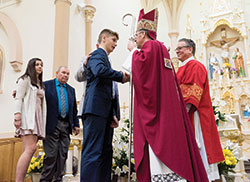
Archbishop Charles C. Thompson shakes hands with Nathan Cullen of St. Teresa Benedicta of the Cross Parish in Bright after conferring upon him the sacrament of confirmation. In the background, fellow parishioner Avery Daniels stands next to her sponsor waiting to receive the sacrament. Archbishop Thompson baptized the youths of St. Teresa Benedicta of the Cross and four other parishes in St. Louis Church in Batesville on April 21. (Submitted photo by Waltz Photography, LLC)
In October, the Vatican hosted a synod, called at the direction of Pope Francis, with the theme “Young People, the Faith and Vocational Discernment.”
Opening up with a question‑and‑answer article with Archbishop Thompson, The Criterion launched a five-part series in preparation for the synod.
“The purpose of the synod is to ask how to better engage young people [ages 16-29] in the life and mission of the Church and its leadership and service,” the archbishop said. “The hope of the synod is to better proclaim the Church’s message to young people so that it can be better heard, understood and appreciated in today’s culture and climate.”
More than 120 youth and young adults in the archdiocese responded to an invitation by Pope Francis “to share their thoughts on their faith and their relationship with the Church,” noted a story in The Criterion.
A committee was formed to summarize the responses which were not only forwarded to the United States Conference of Catholic Bishops, but also the Holy See. The general results and a sampling of quotes were published in The Criterion.
“For me,” said Ken Ogorek, archdiocesan director of catechesis, “this process highlighted the need to keep encouraging those who serve and minister to—and with—youths and young adults. Conversations about faith can sometimes be awkward and challenging. But young folks tend to value authenticity.
“I hope that when the Holy Father issues his teaching document flowing from the synod,” Ogorek continued, “people of various ages will read and reflect on it, taking it to heart as affirming the good in youths and challenging us all to be more fervent, loving disciples of Jesus.”
News Coverage:
Other Stories:
Related:
5. The suspension of a Roncalli High School counselor sparks intense debate.
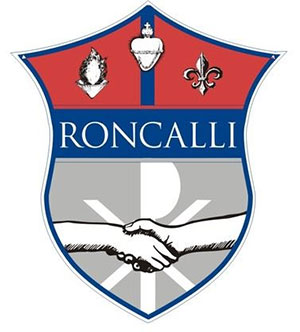 After initially remaining quiet out of respect for privacy and personnel issues, Archbishop Thompson publicly responded in August to address an issue that had made headlines both in Indiana and nationally.
After initially remaining quiet out of respect for privacy and personnel issues, Archbishop Thompson publicly responded in August to address an issue that had made headlines both in Indiana and nationally.
The debate was focused around Shelly Fitzgerald, a guidance counselor who had, up to this year, been employed at Roncalli High School.
“As has been reported in the media and discussed publicly by Ms. Fitzgerald,” the archbishop wrote in The Criterion, “she is living in a civil marriage to another woman that is not valid in the eyes of the Church. She is on paid administrative leave. The issue concerning Ms. Fitzgerald’s employment is not about sexual orientation, but about the Church’s teaching that marriage is a covenant between a man and a woman as established and revealed by God.
“The archdiocese’s Catholic schools are ministries of the Church. School administrators, teachers and guidance counselors are ministers of the faith who are called to share in the mission of the Church. No one has a right to a ministerial position, but once they are called to serve in a ministerial role they must lead by word and example. As ministers, they must convey and be supportive of the teachings of the Catholic Church. These expectations are clearly spelled out in school ministerial job descriptions and contracts, so everyone understands their obligations.
“When a person is not fulfilling their obligations as a minister of the faith within a school,” Archbishop Thompson continued, “Church and school leadership address the situation by working with the person to find a path of accompaniment that will lead to a resolution in accordance with Church teaching.”
News Coverage:
Related:
6. Deported mother of two becomes a local face for larger immigration issues.
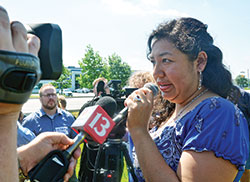
Erika Fierro speaks with members of the press after her May 31 meeting with Intensive Supervision Appearance Program officials in Indianapolis. She was expecting to be deported to Mexico during the meeting, but was instead given a removal date of June 26. That date, she says, is still too early for her two children’s passports to be issued. (Photo by Natalie Hoefer)
Erika Fierro was brought to the United States 30 years ago when she was 5 years old. The 2001 graduate of Beech Grove High School in Beech Grove lived in Indianapolis where she married her husband Jesus, served in a Catholic parish and had two children.
Never a U.S. citizen, and not eligible for Deferred Action for Childhood Arrivals (DACA) status because she was formerly deported and returned illegally in 2007, Fierro faced deportation again—while her children remained in the U.S. waiting for passports.
With her husband having already been deported, she attended a hearing to plead her case to remain with her children and away from a homeland that she was fearful of due to violence.
Archbishop Thompson, along with clergy from various denominations and other immigration advocates, met with her on the day of her hearing to show their support.
After praying over her, the archbishop offered comments at a press conference: “Pope Francis has reminded us that immigrants, migrants and refugees are not to be treated as second‑class human beings. He reminds us that immigrants, migrants and refugees—just like the unborn, the poor, the elderly, the sick—are not problems to be solved, but are human beings to be loved and respected.”
Ultimately, Fierro was deported, but was allowed to drive herself to the border with her children and cross into Mexico with them.
News Coverage:
Other Stories:
Related:
7. The archdiocese announces final parish changes from its Connected in the Spirit process.
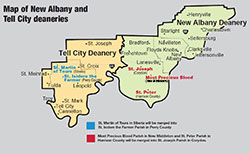
Map of New Albany and
Tell City deaneries.
The Connected in the Spirit parish planning process began in the Terre Haute Deanery in 2008.
The goal of the process, which has since been implemented under the oversight of three different archbishops, “is to strengthen Catholic identity, presence and mission throughout the 39 counties in the 11 deaneries that comprise the Archdiocese of Indianapolis,” Archbishop Thompson noted.
The final decrees of the process saw the merging of three parishes in the New Albany and Tell City deaneries, as well as the linking of other parish communities.
“I realize the reality of the grieving process that goes along with change in both the lives of individuals and communities,” Archbishop Thompson said. “That grief is real and must be honored. However, there is also the reality of new life and energy that often takes root over time.”
In a story reported in The Criterion, Annette “Mickey” Lentz, archdiocesan chancellor, said she has seen an increase in cooperation in parishes as the effort evolved.
She said the process has “made us take a hard look at things. People have been connected in some way, either liturgically or in sharing resources.”
News Coverage:
Related:
8. The inaugural Indiana March for Life attracts hundreds who want to give witness to the dignity of life.
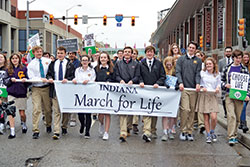
Students from Saint Theodore Guérin High School in Noblesville, Ind., in the Lafayette Diocese, lead a procession of approximately 500 participants along Capitol Avenue in Indianapolis on Jan. 22 for the inaugural Indiana March for Life, an event coordinated by the Archdiocese of Indianapolis, the Lafayette Diocese and Right to Life of Indianapolis. (Photo by Natalie Hoefer)
Approximately 500 people participated in the first Indiana March for Life in Indianapolis on Jan. 22—the date marking the 1973 Roe v. Wade and Doe v. Bolton decisions by the United States Supreme Court which legalized abortion across the country.
A local alternative to the massive March for Life held as a national event each January in Washington, D.C., “the event was the culmination of efforts by the Archdiocese of Indianapolis, the Diocese of Lafayette and Right to Life of Indianapolis,” said a story in The Criterion. “Their goal was to support and raise awareness of the pro-life cause, and to promote pro-life action and legislation at the state level.”
After the march, a rally took place on the lawn of the Indiana Statehouse that featured several speakers, including Abby Johnson, a former Planned Parenthood director who has become a pro-life advocate.
Prior to the march, more than 1,000 people worshipped at a Mass celebrated by Archbishop Thompson at St. John the Evangelist Church in Indianapolis.
“Within the common bond of our humanity,” Archbishop Thompson said in his homily, “we must recognize our responsibility to one another, especially the most vulnerable among us.”
News Coverage:
Related:
9. Local delegates attend regional and national V Encuentro gatherings.
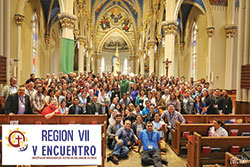
Region VII Encuentro representatives from Illinois, Indiana and Wisconsin pose for a group photo in the Basilica of the Sacred Heart on the campus of the University of Notre Dame after the closing Mass on June 10. (Submitted photo)
“Nearly 200 Hispanic ministry leaders from 13 dioceses in Illinois, Wisconsin and Indiana—including the Archdiocese of Indianapolis—gathered at the University of Notre Dame near South Bend, Ind., for the Region VII Encuentro on June 8-10,” read a staff report in The Criterion.
“Like other regional encuentros—the Spanish word for ‘encounter’—being held around the country, the gathering at Notre Dame was part of the process leading up to the Fifth National Encuentro of Hispanic/Latino Ministry or V Encuentro.”
The event offered “a discernment process that allowed the Hispanic community to understand its call in the Church of the U.S.,” said Oscar Castellano, director of the archdiocesan Office of Intercultural Ministry. “It was an opportunity to [be a] voice [for] those who are not heard and part of the Church living in the peripheries.”
In September, more than 3,200 Hispanic Catholic leaders and 125 bishops gathered for the national Encuentro in Grapevine, Texas.
Saul Llacsa, archdiocesan coordinator of Hispanic ministry, attended the event with Archbishop Thompson and other local delegates.
“We are called to be bridges of an encounter of love,” Llacsa said. “We have the conviction that we are called to an encounter with Christ. The Latino/Hispanic community has the mission to proclaim the Good News wherever we go. It is embedded in our hearts and our culture.”
News Coverage:
Related:
10. Father Jeffrey Dufresne is ordained a priest.
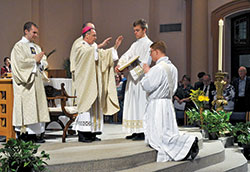
Archbishop Charles C. Thompson, second from left, prays a prayer of consecration over transitional Deacon Jeffrey Dufresne on June 2 during a Mass in SS. Peter and Paul Cathedral in Indianapolis in which Deacon Dufresne was ordained a priest for the Archdiocese of Indianapolis. Assisting in the liturgy are, from left, transitional Deacons Vincent Gilmore, Timothy DeCrane (obscured) and seminarian Charlie Wessel. (Photo by Sean Gallagher)
Each year, the ordination of one or more priests is an important moment in the life of the local Church. Father Jeffrey Dufresne was ordained on June 2 to serve the Catholics of central and southern Indiana.
“In his homily that he offered just minutes before the laying on of hands, Archbishop Thompson, echoing the repeated call of Pope Francis, exhorted Deacon Dufresne in his priestly life and ministry to ‘cultivate a culture of accompaniment, dialogue, encounter and mercy,’ ” noted a story in The Criterion.
While the hard work of fostering such a culture takes place in the grittiness of everyday life and sometimes difficult relationships, Archbishop Thompson noted that this necessary ministry is rooted in the fundamentals of the Gospel.
The Mass featured the attendance of most of the priests of the archdiocese, who offered their prayers and support for the new priest, particularly during the laying on of hands.
“I really do admire our presbyterate,” Father Dufresne said. “They’re all men of authenticity. During that time, I was praying that the Lord would give me the strength to be a priest as good, faithful and as authentic as they are.”
News Coverage:
Other Stories:
Related:





 After initially remaining quiet out of respect for privacy and personnel issues, Archbishop Thompson publicly responded in August to address an issue that had made headlines both in Indiana and nationally.
After initially remaining quiet out of respect for privacy and personnel issues, Archbishop Thompson publicly responded in August to address an issue that had made headlines both in Indiana and nationally.



